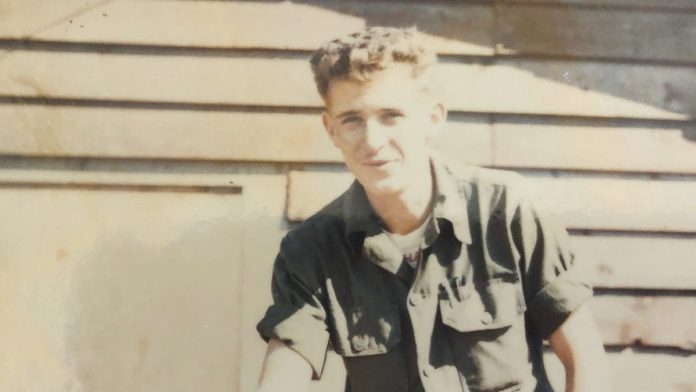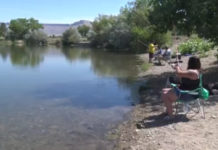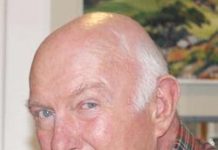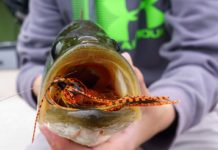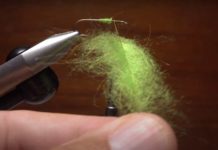This is the first installment of an interview that historian Joe Todd did with Jimmie Akers of Kaw City on April 16 in Bartlesville. The interview has been lightly edited for length and clarity.
Jimmie Akers was born Oct. 1, 1947, in Bartlesville to Jack and Joyce (Bryant) Akers.
Todd: Did you go through school in Bartlesville?
Akers: No. I went through school in Europe. I started here in Bartlesville, and Dad being in the service, we got transferred to Europe. We went to Salzburg, Austria, then when the Korean War broke out, we went to Italy. Then in 1955, we left Vincennes, Italy, by a converted troop ship, the USS Johnson to New York. Dad was stationed at Fort Hood (Texas) from 1960 until 1965, and right after the earthquake in Anchorage, Alaska, he was stationed at Fort Wainwright. That is where I got my draft notice.
T: How old were you when you left Bartlesville?
A: We left here in 1951.
T: What school did you attend in Bartlesville?
A: Right where the big auditorium is now.
T: Garfield.
A: The door where the post office is at, that side door on the post office on Oklahoma 60 is where our house was. Right west of it, my uncle had his grocery store.
T: You graduated high school what year?
A: 1967.
T: From what high school?
A: An Khe, Vietnam, GED.
T: What was it like being a kid in Europe?
A: It was great. Weekends, as soon as Dad got of work, we would load up the old Buick and we would travel all over Germany and camp out in the forest. We would take in sights and castles. Dad ended up running a rod and gun club, and when the military got new streams to fish, Dad had to go out and stake it out. We were over in Bad Kissingen and we got this one stream to do. It was 5 1/2 kilometers that we could fish and it was right up along the Russian border. We were fishing it, Dad and I both, fly fishing. There was a nice eddy pool where a little river took off to the right. I was wanting to fish that real bad and I was working up to it. Dad hollered at me and said, “Jim, turn around and start fishing your way out.” I said, “I want to fish this curve down here.” “Turn around and fish it out!” So, we did and fished maybe 400 yards and Dad laid his rod down and walked over to this clump of trees, and bushes had it all covered up. He saw some wood sticking out and what it was, was a sign that said, “You are now entering the Russian sector. All US and military personnel keep out.” We had already fished about 400 yards in. That was a good experience. Other than that, we had a ball. Salzburg, Austria, I was a little kid and doing the military school. We went down to Vincennes, Italy, and went on base to a military school. We came back to the United States for six months than back to Germany until 1960.
T: What was the attitude of the local people to you?
A: Back then, they were grateful. The Germans were great people. I never heard a cross word and they were grateful. It was right after World War II when we were over there. This was 1955 and the war was over in 1945. The people were nice and they were rebuilding. They were helpful. If you didn’t know German, they would try to help you.
T: Where were you when Kennedy was assassinated?
A: I was in Copperas Cove, Texas, walking out of Ag Class when they announced the word. They dismissed school for the rest of the day. That was 1963.
T: Nov. 22, 1963. What did you think when Kennedy had been shot?
A: Am I going out tonight? Do I have a date, because there is no school tomorrow? I really didn’t give it much thought. Being a heathen redneck down in Texas, you look out for yourself, what you are going to do, who you are going out with.
T: When did you get your draft notice?
A: I got my draft notice in Feb. 7, 1966.
T: When you go your draft notice, what did you think?
A: Here we go. My dad was service and I reported in March 3 and they flew me from Fairbanks down to Anchorage and was sworn in and went down to Fort Ord, California, that night. I started Basic Training the next day. It was a rush, rush, rush, rush job. They were going to send me to Fort Polk, Louisiana, and I called Dad, and said, “Hey, dad what can I do, I am lazy, I don’t like to walk?” He said, “The best thing for you to do is take an extra year, go RA and take your choice.” I said, “OK” and that is what I did, and I went aviation. They were going to send me to Jackson, Mississippi, for ATC School (Air Traffic Control) after basic. I called Dad and said that is not what I wanted. I wanted rotary or fixed-wing aircraft. He said, “Submit a 1049 and get out of the service for breach of contract.” I said, OK. That 1049 lasted about two hours and they sent me to Fort Rucker, Alabama.
T: Before we get there, tell me about Basic.
A: I took a little movie film of it and have it at the house. They challenged everybody against other companies, other battalions and squads. It was a challenge between each other. Being young, dumb and stupid at that time, you were not about to be outdone and we did our thing.
T: What type of training did you have?
A: I called it grunt training, infantry training. Basically, that is what everybody was getting, 11Bravo. I didn’t like the idea of walking with ruck sacks with that M-14 they issued us. That M-14 weighed 11.7 pounds.
T: What is your most vivid memory of Basic?
A: When I called the lieutenant, “Sergeant” because he made me mad.
T: What happened?
A: Front-leaning rest position for 15 minutes in his office while he chewed me out. His name was Lt. Pissarro. The whole time during Basic, when he hollered “Akers”, I had to run up there and I had 10 seconds to be there with a cigarette for him. At the end of Basic, bless his heart, he bought me a carton of cigarettes, Kool’s, and said, “Thank you.” He was sure rough on me during Basic.
T: Why was he rough on you?
A: Because I called him sergeant. He was going to make an example of me. I didn’t mind it; I had seen it before and I played their game.
T: Basic lasted how long?
A: Three months back then. I went in March and got out the beginning of June. They gave me two weeks to go home and all that rigmarole on 11B and got my orders rescinded and went to Fort Rucker.
T: Tell me about Fort Rucker.
A: I know more about Dothan, Alabama than I do Fort Rucker. Fort Rucker was interesting, I went to mechanics school and went to flight school; we went to survival school. I had never seen so much stuff crammed into you in such a short period of time as when we were there. Everything lasted about eight weeks. When we got finished with Fort Rucker, they gave us two weeks leave to go home. Everyone out of our company with the exception of 17 of us were assigned to the 17th Aviation Company at An Khe. Everybody else was just Repo-Depot.
T: When you got orders for Vietnam, what was your reaction?
A: I knew I was going to Vietnam; there was no getting around that one. It took an act of God to go to Germany, someone you knew or one of the big boys got you in a safe place.
T: Were you trained to be a helicopter mechanic?
A: I was trained to be a helicopter mechanic, but I was trained to be a fixed-wing mechanic on the R-2000.
T: What is the R-2000?
A: An 18-cylinder engine (Pratt & Whitney R-2000 Twin Wasp radial engine). We were assigned to 17th Aviation, the Caribou, the old CV-2B.
T: How did you travel to Vietnam?
A: Pan-American Airways.
T: You left from where?
A: Out of San Francisco, Travis Air Force Base.
T: When did you leave for Vietnam?
A: Arrived in country Sept. 15, 1966.
T: Did you land in An Khe?
A: No. We landed at Tan Son Nhut. We got in there late at night. Everyone that had orders to an assigned unit were taken off and they put us in a separate area and everybody else went to a Repo-Depot tent. It seems we got in about 5 or 6 in the evening and they took us by bus out to the staging area. I remember the wire mesh on the bus windows and I thought this was a real friendly town. We got out there and they separated us and the next morning at 5 o’clock, they came and got us. There was no formation, no nothing and put us in the chow line, fed us and took us to the flight line and 17 of us went to 17th Aviation. They assigned us ahead of light colonels and on down. We got up to An Khe around 2 p.m. They gave us a bunk and the next day, we were back at work.
T: 17th Aviation is the First Air Cav?
A: First Air Cav. Then the Air Force took over the Caribous Jan. 1, 1967, and that left me without a job. I went to the 15th Transportation Maintenance Company. I flew out of rotary wing there. I had on-the-job training because I was a crew chief and filled in here and there. An old boy by the name of Vince Cadeshy, he was from New York. That guy was something else; he did not like what happened to him. He said, “I came over here to be on fixed wing, not these flapping wings.”
T: Were you on Hueys?
A: Yes, the UH-1. We had C Models and D Models. It just depended on where they wanted to shove you to. I got tired of that and came back home for my sister’s wedding and had to stay an extra six months to do that. Then I transferred over the 4th Infantry there at Pleiku.
T: What type of quarters did you have at An Khe?
A: Tent with sandbags about halfway up the side with a “Fraidy hole”. We looked like a bunch of rats when we had incoming trying to fight for that fraidy hole.
T: Tell me about the rocket and mortar attacks.
A: Which one?
T: Your most vivid memory.
A: That was over at Pleiku. A buddy and me were sitting out on the sandbags, right outside the hooch. We were drinking beer, and Larry was a guitarist. He loved his guitar. We were sitting there and I saw a flash on the side of the hill, just about a mile away. Then I heard the whistle go overhead and I thought, “This is not nice.” I told Larry, “Incoming” and about that time, it hit up on the flight line. I said, “Watch over on the side of the hill.” There was a flash again. When we saw the flash, I would count, “12, 13” and hear that whistle going overhead. About eight rounds hit upon the flight line, and the flight line was a quarter-mile from us. I was counting “14, 15” and said, “Larry, this isn’t nice, get in the bunker.” We no longer got off those sandbags and it hit on our baseball diamond. A little fragmentation but a lot of concussion. I got peppered in the neck and in the back and Larry got peppered in the butt and legs. He got one in the butt and two in the legs and I got one in the neck and two in the back. That sticks out in my mind. It ruined a good beer, that was the bad part about it.
Credit: Source link

















